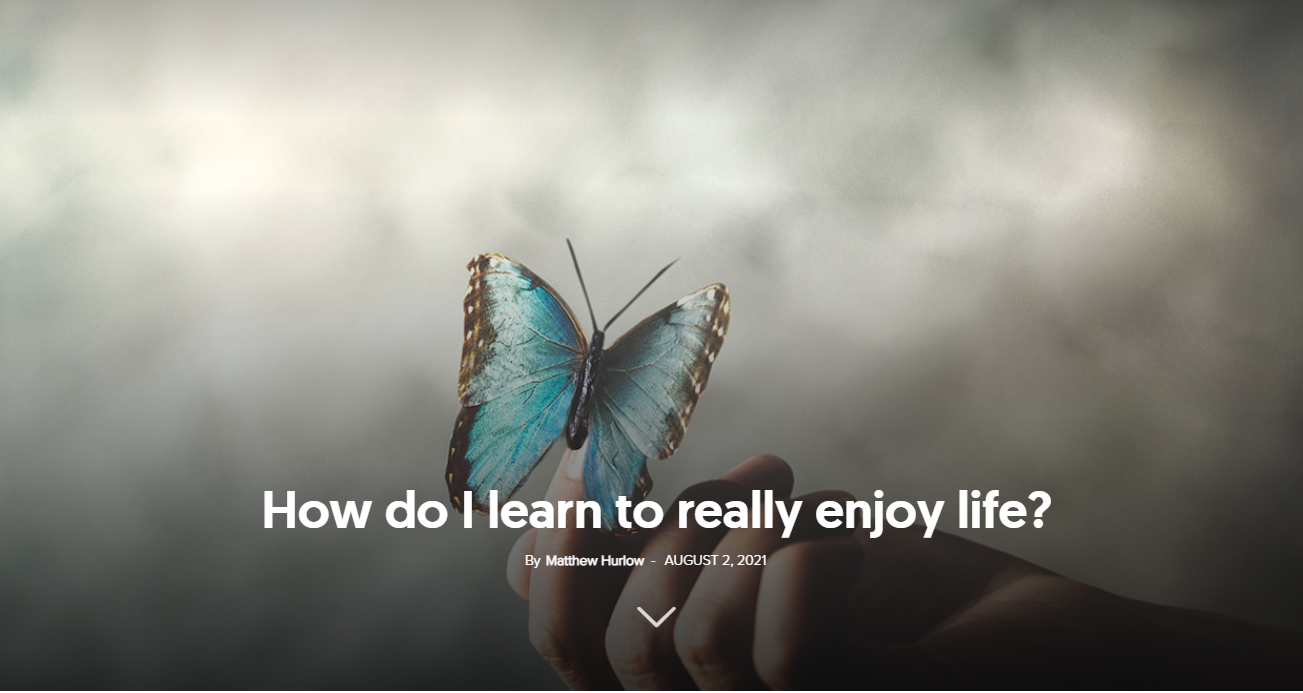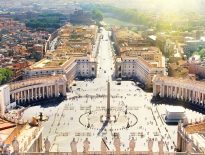“From one man he made all the nations, that they should inhabit the whole earth; and he marked out their appointed times in history and the boundaries of their lands. God did this so that they would seek him and perhaps reach out for him and find him, though he is not far from any one of us” (Acts 17:26-27).
I can’t remember the moment when I realised that I exist, but I can say that for as long as I can remember, I have been on a constant quest. In my childhood, adolescent pride held up before my eyes all sorts of mirrors capable of “messianic” reflections. Such self-perceptions had the power to distort reality into one enriched by a special destiny. Just as I learned as a child that my father was not the strongest, I discovered as a teenager that I was just one of many who wanted their lives to have special meaning and offer certainty.
Juggling a myriad of perils, I have gone through perfectionism, utilitarianism, pragmatism, idealism, and other such paths, but more than ever, the year 2022 has freed me from the pressure of searching for meaning. I have found part of the answer to the question posed by Horia Roman Patapievici in Flying against the Arrow, which has defined a generation: “Where do you look for what you have never found?”
Essentialism and existentialism: who precedes whom?
According to ancient Greek philosophy, a person’s essence exists before he or she is born, which means that a good person is one who is true to his or her essence. Essence gives a person meaning—you are born to be something. Until the 19th century, this was the dominant worldview. People did not have to make sense of what happened to them, but it was their duty to accept it. The important thing was for everyone to fulfil their destiny, their purpose.
Everything has an essence, and human beings are no exception to this rule. There are a number of characteristics that are necessary for a thing to be what it is. A knife can have different colours, handles made of different materials, but if it lacks a blade, it is certainly not a knife. The blade is the essential feature of the knife because it gives it its function—to cut.
If everyone’s function is given to us before we are born, it frees us from the pressure and immense stakes of the quest. We are freed from the uncertainty of trying to find answers to thousands of unanswered questions. Why is such and such happening to me? Why does something happen? The essence that precedes us has decided and we are only asked to live. The responsibility lies with the One who has decided our fate, and we are relieved of the effort of finding the right path and the difficult answers: “The secret things belong to the Lord our God”; “I was born into this religion and so I will die”; “It was meant for me to live in poverty”, and so on. A bland view of the world, but comfortable in its lack of responsibility.
Is it all meaningless?
Through Nietzsche’s nihilism at the end of the 19th century, followed by J.P. Sartre’s perspective at the beginning of the 20th century, and refined by the two world wars, existentialism changed the perspective on life. Believing that nothing has meaning, and placing existence before essence, along with the absurdity of the suffering caused by the two world wars, created the framework for existentialism. Humans are born without a purpose, and it is their duty to give themselves one. Existence precedes essence. I decide who I want to be. There is no destiny that I must follow or a purpose that I must fulfil. Therefore, I don’t have to explain myself to anyone, nor can I be “lost”. We are the ones who give meaning to our own lives.
The turmoil of the religious person
As religious people, we are in constant danger of being caught between the two perspectives. We fear the perspective of existentialism because it can remove God from our consciousness, but at the same time, it is exhausting to integrate the absurdity of life into a puzzle with predetermined meaning. Of course, we would prefer God to make sense of it all and for us to have the joy of easily understanding Him.
We are afraid to decide for ourselves without asking God, but at the same time, God’s silence following specific prayers is deafening. If there is a will of God for each of us, shouldn’t it be clearer? The lack of clarity in His voice can lead not only to a failure to understand His will, but can sometimes leave us prey to darkness and doubt.
As we become weary in our search for meaning, we are tempted to choose only the pursuit of pleasure and happiness. So we look at life very instrumentally. We use it; we use it to achieve different things in the hope that we will have meaning. We seek meaning through what we can do with our lives. Pleasure, distraction, and achievement are some of the fruits of instrumentalising life. We define our identity by how we use our lives. The more we do important things, the more we experience success on a deeper level, the more we taste pleasure, and the more meaningful we imagine ourselves to be.
On the other hand, even if we step out of the zone of materialistic seeking and use spiritual landmarks to guide us, the search remains agonising and the path equally unclear. I have never been able to satisfy my search for meaning, not even through spiritual achievements. No matter how I used life, either for material or spiritual achievements, the turmoil always remained present. After all, what difference would it make if, in order to find my meaning, I did everything in my power to achieve the good, the beautiful and the honourable, or maybe to experience pleasure? What is more, when I think of the failures and hardships that come my way without my being able to avoid them, the darkness deepens. Am I what I do or only what happens to me?
Another option is to accept nihilism. It frees the soul from the turmoil of the search. A failure to identify the meaning of what is happening and especially the meaning of one’s own existence, has led to the widespread belief that the world has no ontological consistency. In other words, there is no truth.
Is everything relative?
Relativists believe that there is no truth because it cannot be attained, and if it can be attained, it cannot be communicated, and if it can be communicated, it cannot be understood. This frees us from any psychological or spiritual pressure. My truth can be in contrast to any other reality. However, even the relativistic hypothesis assumes one truth, namely that everything is relative! Is this statement true or false? If it is true, then the hypothesis is false. This is the paradox of the liar.
The world is built on the assertion that there is truth. The claim that the world exists is the truth. Ontological truth speaks about the nature of things because they exist. A chair is true because it exists. Everything that exists is true simply by virtue of the consistency of the existence of specific and irrefutable properties of each and every thing that makes up reality. In other words, existence is truth. Without that truth, there would be nothing. Even interpersonal communication is based on the assumption that there is truth. We would not enter into such a dialogue without this common belief: there is truth.
I am who I am!
God says of Himself in Scripture: “I am who I am” (Exodus 3:14). The fundamental quality of God is Existence itself. In the New Testament, Jesus Christ describes Himself as the way, the truth, and the life—all these are united in Christ. The Godhead is the only being that has underived life, and all that exists is a result of God sustaining life. “For in Him all things were created. He is before all things, and in Him, all things hold together” (Colossians 1:16-17). Everything that exists has life and meaning through Jesus Christ.
Life can only come from life
Life is a miracle, and like all miracles, it requires revelation. Both the genesis of any quest and its finality are condensed in the awareness that we are. Life is not born out of non-being, but, like everything that is born, requires a mother and a father. Just as animals give birth to animals and fruit trees bear fruit, life can only be born out of life. To think that being is born of non-being is more absurd than to think that animals are born of trees. The absurdity of the relationship between tree and animal, with one as the source of the existence of the other, is less absurd than the absurdity of the causal relationship of nothing to something. The antithesis of being and non-being is greater than the contrast between tree and animal. Therefore, there must be a Life without origin. Life is a miracle, and understanding it requires revelation.
Augustine, in antiquity, and Constantin Noica, in modernity, said that in human beings there is something deeper than themselves. Scripture identifies in humans a moral-spiritual image after which they are made.
Life is a miracle in need of revelation
With all its natural, hermeneutic, rational, and other tools, science still has great difficulty in understanding what matter is and how it works. When we think of humans and the life that animates them, revelation is the only chance for becoming aware of one’s self-worth.
The awareness of being alive becomes a powerful argument for the existence of a supreme, beginningless life. Because I live, God must exist. Life is a splendour. It alone is enough to light our lives with meaning and joy. This is what Jesus’ closest disciples believed: “In him was life, and that life was the light of all mankind” (John 1:4); “For to me, to live is Christ and to die is gain” (Philippians 1:21).
Through the life of Vasile Adamescu—a man whose condition condemned him to the fate of aquatic organisms without sight or hearing—I understood even better that life is a miracle, a splendour. How can you know that you’re alive if you have no sight and no sound in your mind? It is impossible to think without the vehicle of words, yet Vasile Adamescu overcame his condition.
Starting with the association between the vibration he felt in his teacher’s throat when she spoke a letter and the water he felt in his glass, Adamescu learned the vibration of the first word, “water”. This was the first step towards communicating with others. He learned to make sounds, then to associate sounds with letters drawn in the palm of his hand, then to read, then to speak, and finally to understand the abstract. As an adult, he became a teacher, a writer, a sculptor, and succeeded in learning five languages. He recognised every place even if he had only been there once, knew how fast cars were going, understood dance styles, sculpted realistic portraits, used Facebook, wrote in Word, played chess, cooked, and so on.
Even though he couldn’t see or hear anything, everything existed for him. This experience gave him a deep relationship with God. From the time he learned to speak until the day he died, Adamescu praised God for making him such a wonderful being. Every day he considered it a gift that he was alive. He said he was never bored. He was always doing something because he felt he owed life to do so. His life was a splendour and when he realised this, even the condition of being deaf and blind was not meaningless.
Ștefăniţă-Marian Poenariu approaches the subject of the meaning of life from the premise that life is a miracle and, like all miracles, a revelation is needed to understand it.




















